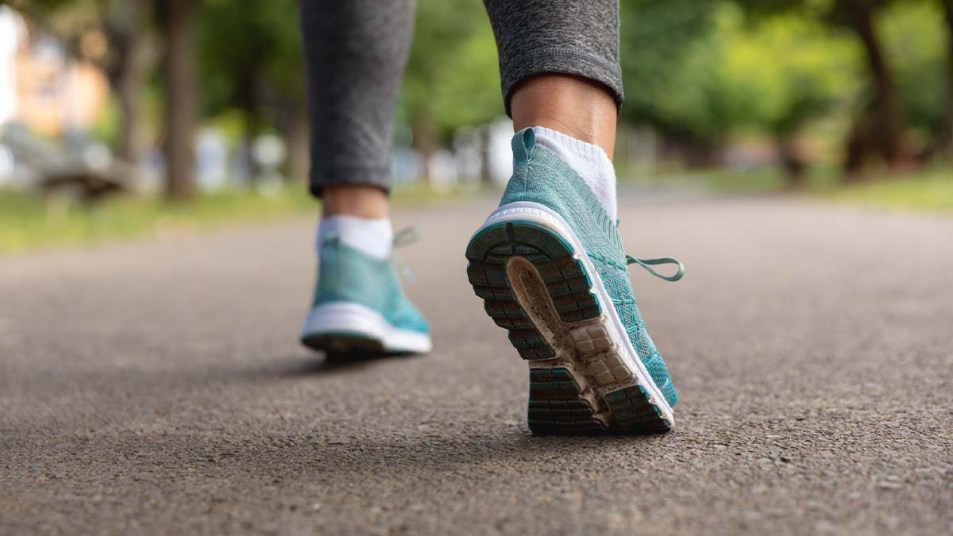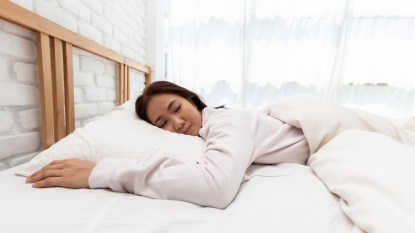Not Getting Enough Sleep Can Make Walking More Difficult

A night full of tossing and turning can leave you feeling sluggish and groggy the next day. It might seem that something like a quick morning stroll could wake you up, but it’s actually harder to even walk to the kitchen without a full night’s rest. New research suggests that a lack of sleep can negatively affect our walking abilities on a day-to-day basis.
Can a lack of sleep cause walking problems?
A recent study published in Scientific Reports looked at how varying levels of sleep deprivation impacts gait, which is the process of walking and balance. Researchers recruited 30 college students for this study because about 40 percent of them are estimated to get less than six hours of sleep each night. This can impact a person’s attention and focus, which are essential to walking smoothly.
Participants didn’t have any previously diagnosed sleep, gait, or balance disorders. They were asked to follow their normal daily routines for two weeks. The study authors monitored the students’ walking rhythm and sleeping patterns during this time. Afterwards, researchers evenly divided the students into three groups.
Students who slept on the weekends to make up for any sleep loss during the week were considered the Control Group (CG). Those who were getting enough rest on the weekdays and didn’t need to compensate for a lack of sleep were known as the Sleep Chronic Restriction group (SCR). The third group of students were called the Sleep Acute Deprivation group (SAD). SAD students were asked to come into the researchers’ lab on a Thursday evening and stay awake into the next morning.
That Friday morning, each of the 30 students was asked to walk on a treadmill and coordinate their steps to the beat of a specific sound. The study’s authors then measured how well students from each group did on this gait test. This test was used to solidify the ways a lack of sleep might affect a person’s walking abilities.
The results showed that those from the CG and SAD groups were more likely to have decreases in their walking balance and overall gait control. Students from the SCR group showed better results doing the gait test because they weren’t missing out on sleep. This allowed them to have a greater level of focus and attention when completing this exercise. Researchers concluded that sleep deprivation can take a toll on the way you walk.
While this study was conducted on college students, it’s applicable to older adults as well. As we age, balance and walking-related issues can be a contributing factor to falls. Beyond walking, a lack of sleep has also been shown to increase the risk of developing dementia and other chronic diseases including diabetes and high blood pressure. Getting seven to eight hours of sleep each night can help you avoid trouble walking and serious health issues over time. Luckily, there’s some simple ways you can do so naturally!
How can I sleep better at night naturally?
If you’re having trouble catching those Zzz’s at night, try adding more snacks such as kiwi, hemp seeds, and pistachios into your daily diet. These foods are rich in melatonin, the key hormone that helps regulate your sleep-wake cycle.
Sticking to the same bedtime every night helps your body know when to start relaxing and feeling sleepy. Aim to be in bed by 10 p.m. and make yourself as comfortable as possible to ensure that you’ll fall asleep soundly. It’s also a good idea to not look at your phone an hour before bed and adjust its settings to silence notifications that might otherwise keep you up at night.
Lightly spraying your pillow with a lavender sleep spray or essential oil can provide a calming, aromatherapeutic effect. This scent can help you get an uninterrupted night of sleep while infusing your room with a floral and sweet smell (a refreshing way to rest).
Give these simple tricks a go so that you can wake up feeling recharged and ready to take on the day. You’ll feel more secure with every step.













